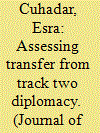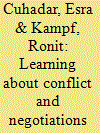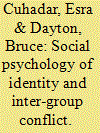|
|
|
Sort Order |
|
|
|
Items / Page
|
|
|
|
|
|
|
| Srl | Item |
| 1 |
ID:
090915


|
|
|
|
|
| Publication |
2009.
|
| Summary/Abstract |
This article focuses on the evaluation of transfer from Track Two diplomacy to negotiations and policymaking by examining four Track Two initiatives between Israelis and Palestinians over the issues of water and Jerusalem. The article first discusses the transfer process for the water and Jerusalem cases and then presents lessons drawn from the comparative study. The comparative assessment reveals similarities concerning transfer in terms of what the contributions of Track Two are to the process of negotiations, which transfer strategies are used, and what conditions are necessary to make a contribution to the outcome. Initiatives in both cases employ primarily the strategy of working with influential people and they are more successful in impacting the process of negotiations rather than the outcome. Their contribution to the process of negotiations shows regularities in the types of learning acquired and used. Successful transfer to outcome is observed in one occasion when transfer strategies were implemented effectively, the negotiators were open to outside information, and there was political willingness. Asymmetrical transfer of people, and of ideas, from Track Two initiatives to negotiations was a barrier to effective transfer.
|
|
|
|
|
|
|
|
|
|
|
|
|
|
|
|
| 2 |
ID:
136172


|
|
|
|
|
| Summary/Abstract |
This paper is based on a cross-national experimental study conducted among American, Turkish, Israeli-Jewish, and Israeli-Palestinian students using a computer game called “PeaceMaker.” The game is a highly realistic and complex simulation of the Israeli-Palestinian conflict. PeaceMaker was used for educational and experimental purposes in a classroom setting and each student played the game in both Israeli and Palestinian decision maker roles. Our purpose was to evaluate the game's effectiveness as a pedagogical tool in teaching about conflict and its resolution, especially with regard to generating knowledge acquisition, perspective taking as a crucial skill in conflict resolution, and attitude change. We were also interested in understanding whether these effects changed depending on whether the participants were direct parties to the conflict or not. In order to gauge the effect of the game in these areas, we used a pre- and post-intervention experimental design and utilized questionnaires. We found that the game increased the level of knowledge about the conflict for the Israeli-Jewish, Israeli-Palestinian, American, and Turkish students. We also found that the game successfully contributed to perspective taking among Turkish and American students only on a contemporary issue related to the conflict.
|
|
|
|
|
|
|
|
|
|
|
|
|
|
|
|
| 3 |
ID:
106355


|
|
|
|
|
| Publication |
2011.
|
| Summary/Abstract |
This paper reviews the seminal theories of social psychology which have guided scholarship on inter-group conflicts and describes how these theories have been used by conflict resolution practitioners to design Track Two diplomacy initiatives among citizens in conflict zones. The authors hope that such a review will provide scholars of conflict resolution and international politics with a better understanding of how complex social theories are adapted for use in the applied world, and how gaps between theory and practice can be identified and addressed. The paper begins with an overview of three of the main theoretical contributions of social psychology to the problem of inter-group conflict: social identity theory, stereotyping and prejudice, and contact theory. We then review how these theories have been applied by conflict resolution specialists in international and ethnic conflicts as they have sought to moderate intergroup hostilities in conflict zones. The paper concludes with an analysis of the gaps between theory and practice, namely: theory of change gap, transfer strategies gap, and unit of analysis gap. Finally, based on the reviewed social psychology research, the article makes policy recommendations about how these gaps between theory and practice can be narrowed.
|
|
|
|
|
|
|
|
|
|
|
|
|
|
|
|
|
|
|
|
|